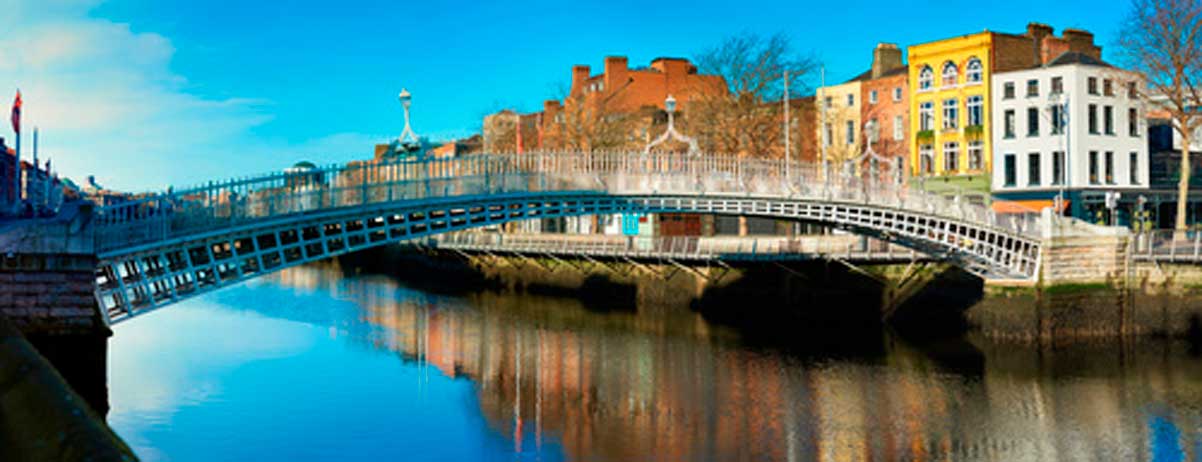The island as a whole as well as the island state (Republic of Ireland) is designated as Ireland.
Ireland (island) is the second largest island in the European archipelago called the British Isles and consists of the Republic of Ireland and Northern Ireland. Northern Ireland is part of the United Kingdom of Great Britain and Northern Ireland, or United Kingdom for short.
The Republic of Ireland (island state, hereinafter referred to as Ireland) is politically independent. The capital and largest city of the country is Dublin, located in the eastern part of the country. The national currency is the euro.
Ireland has been a member of the European Union since 1973 but does not apply the border provisions of the Schengen Agreement.
Ireland has traditionally been a popular emigration country for writers and other artists due to the Irish tax exemption for artists. Since 2007, however, this exemption has been reduced and the Tax Amendment Act 2011 introduced an exemption ceiling of €40,000, and since January 2015 it has been €50,000.
Reasons for the location Ireland
- Ireland offers a corporation tax rate on trading income of 12.5%. This means that a moderate level of taxation can be achieved in principle, without the need for elaborate and therefore usually expensive and often artificial constructions in exotic locations.
- Ireland currently has a “Special Assignee Relief Programme” (SARP), see “Tax relief and public subsidies”.
- For transactions mainly in the euro currency area, there is no need to convert to a national currency, as Ireland is a euro currency area.
- If you were thinking of an English Limited in the first step, you will find a legally and culturally similar environment here.
- Ireland currently has a double taxation agreement with 72 countries and is therefore one of the countries with the most agreements.
- Ireland pursues a pro-entrepreneurial economic policy.
- The Irish government has a consistent decade-long policy of welcoming foreign-controlled companies.
- Ireland has good international air links from continental Europe and England. It would therefore be possible to manage a company locally, as would be the case with a location in London, for example.
- As far as residence in Ireland is concerned, the climate is mild, the transport and communications network are good, and the crime rate is low. On the one hand, the Irish economy has suffered a severe recession in recent years, but on the other hand this may be irrelevant if there is no local business activity, and property prices, as well as other costs of living, are correspondingly low, especially in comparison with Greater London.
- Ireland is said to have a well-educated workforce in many areas of expertise and a family-friendly environment, so Ireland is said to be a good place to get national and international professionals.
- In the 2018 World Bank report on “Doing Business” there are 7 countries in the EU area that came in the top 10 in each of the criteria (among others) “ease of starting a business”, “ease of running a business” and “administrative conditions for tax assessment” (with different positions in each of the 3 criteria): Estonia, Finland, Great Britain, Ireland, Latvia, Lithuania and Sweden.
Company Taxation
Irish corporation tax law is one of the most attractive in the world due to a low tax rate with a wide network of double taxation agreements with other countries.
Irish companies are taxed at a rate of 12.5% on trading income. For income other than trading income the rate is 25%.
The rate on commercial income is one of the lowest in Europe. Only the Isle of Man and the Channel Islands (Jersey, Guernsey, etc.) with a rate of 0% and Cyprus and some Eastern European countries with rates of 10% are lower. The Irish rate is one of the lowest in the developed economies of the world.
Ireland is on the OECD’s “White List” and has concluded numerous agreements on the intergovernmental exchange of information for tax purposes with other countries.
Income tax
For unmarried taxpayers, the income tax rate is 20% on the first €34,500 and 40% on the income beyond that. For married taxpayers, the amount for the first tax bracket of 20% is doubled.
The basic allowances are € 1,650 for unmarried taxpayers and double for married taxpayers.
The Universal Social Charge (USC) is calculated as follows:
- 5 % on the first € 12,012 of annual income
- 2 % on the next € 7,360 of annual income
- 4,75 % on the next € 50.672 of annual income
- 8 % on the rest of the annual income
All figures refer to the 2018 tax year.
Individual with domicile (centre of life) outside of Ireland
Income tax rates in Ireland are high in real terms, but there are tax benefits for individuals who are not resident in Ireland.
In essence, a person who is resident but not domiciled in Ireland pays income tax only on Irish income and on foreign income imported into Ireland. Consequently, if most of the income remains outside Ireland, it will not be subject to income tax in Ireland. This scheme is the remittance basis tax institution. This regime also exists in England. If you are interested in more information on the basic operation of this scheme, please refer to our presentation of the narrow remittance basis under Taxation UK.
Residence in Ireland
Residence is determined by the number of days spent in Ireland during a tax year, according to the criteria of Irish tax law.
Residence is established thereafter if
- 183 days or more have been spent in Ireland in any one tax year, or
- if 280 days or more have been spent in Ireland over a period of 2 consecutive tax years.
Residence is then established for the second of these years.
However, 30 days or less within a tax year does not qualify for the 2-year assessment.
Wealthy individuals
The Tax Amendment Act 2010 has introduced a domicile levy of €200,000 on high net worth individuals who have their domicile (centre of life) in Ireland, irrespective of where they actually reside and who also meet the following criteria:
- An Irish income tax burden of less than € 200,000 and
- A worldwide income of more than € 1 million and
- A capital of € 5 million or more situated in Ireland


